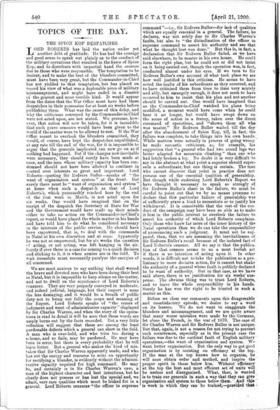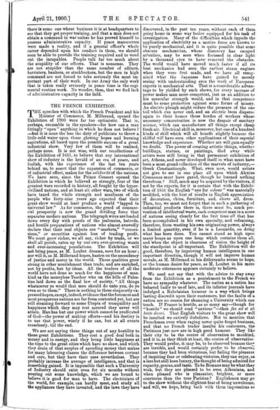TOPICS OF THE DAY.
THE SPION KOP DgSPATCHES. TjORD ROBERTS has laid the nation under yet another debt of gratitude. He has had the courage and good sense to speak out plainly as to the conduct of the military operations that resulted in the fiasco of Spion Kop, and to distribute with impartial• hand the censure due to those who were responsible. The temptationto be lenient, and to make the best of the blunders committed, must have been very great, but the Commander-in-Chief has not yielded to that temptation, but has placed on record his view of what was a deplorable piece of military. mismanagement, and might have ended in a disaster of the gravest and most terrible kind. It would appear from the dates that the War Office must have had these despatches in their possession for at least six weeks before publishing them. What was the cause of this delay, and why the criticisms conveyed by the Commander-in-Chief were not acted upon, are not stated. We presume, how- ever, that action will now be taken, for it is incredible that such grave censures would have been given to the world if the matter were to be allowed to rest. If the War Office meant to overlook the blunders committed, they would, of course, have kept the despatches unpublished, at any rate till the end of the war, for it is impossible to argue that the generals implicated can now go on as if nothing had. happened. But if the changes now inevitable were .necessary, they should surely have been made at once, and the men whose military capacity has been con- demned should not have been allowed to continue in control over interests so great and important. Lord Roberts—quoting Sir Redvers Buller—speaks of "the want of organisation and system" at the front. But surely there must be "want of organisation and system" at home when such a despatch as that of Lord Roberts's, which presumably reached here by the end ' of the first week in March, is not acted upon for six weeks. One would have imagined that on the receipt of the despatch the Secretary of State for War and the Government would have made up their minds either to take no action on the Commander-in-Chief's report, or would have placed the whole matter in his hands and have told him to do what he considered necessary in the interests of the public service. He should have been empowered, that is, to deal with the commands in Natal at his own discretion and at once. Apparently he was not so empowered, but for six weeks the question of acting, or not acting, was left hanging in the air. Surely if ever there is a case for coming to a quick decision and- sticking to it, it is when armies are in the field. To wait irresolute must necessarily paralyse the energies of all concerned.
We are most anxious to say nothing that shall wound the brave and devoted men who have been doing their best in Natal, but it is impossible to keep silence on the matter, and not to dwell on the significance of Lord Roberts's censures. They are very properly conveyed in moderate, and indeed judicial, language, but their import is none the less damaging, and, it would be a breach of public duty not to bring out fully the scope and meaning of the Report. Lord Roberts speaks of "the errors of judgment and want of administrative capacity "displayed by Sir Charles Warren, and when the story of the opera- tions is read in detail it will be seen that these words are amply borne out by the facts recorded. But a very little reflection will suggest that these are among the least pardonable defects which a general can show in the field. A man who is over-bold, and who tries too daring a scheme, and so fails, may be pardoned. He v have been in error, but there is every probability that he will learn better. But a general who makes the kind of mis- takes that . Sir Charles Warren apparently mad, and who has not 'the energy and resource to .seize. an opportunity for rectifying a blander, is evidently without the adminis- trative-capacity required for high -command. He may be, and certainly is in Sir Charles Warren's 'case,- a man of the highest character and best intentions, but he clearly does not possess or has lost the !special and, we admit, very rare qualities which must be looked for in a general. • Lordltoberts tensuresm the officer in supreme command "—i.e., Sir Redvers Buller—for lack of qualities' which are equally essential in a general. The failure; be declares, was not solely due to Sir Charles Warren's faults, but also to "the disinclination of the officer in supreme command to assert his authority and. see that what he thought best was done." But this is, in fact, a declaration that Sir Redvers Buller failed, as we have said, elsewhere, to be master in his own house. He could form the right plan, but he could not or did not insist on it being carried out, though the operation was, in fact, .conducted almost under his eyes. If we turn to Sir Redvers Buller's own account of what took place we see how well justified is this criticism. He seems to have noted the faults of his subordinate as they occurred, and to have criticised them from time to time very acutely and ably, but strangely enough, it does not seem to have occurred to him to insist that his plan and not another should be carried out. One would have imagined that as the Commander-in-Chief watched his plans being muddled, a moment would have come when he could bear it no longer, but would have swept down on the scene of action in a frenzy, taken over the direct command of operations, and 'shown them all who was master." Sir Redvers Buller waited till the day after the abandonment of Spion Kop, till, in fact, the failure was complete, to take things into his own hands.
While matters were actually in process of going wrong he made sarcastic criticisms, as,- for example, his suggestion that "a general who had two sound legs was better adapted for mountain climbing" than one who • had lately broken a leg. No doubt it is very difficult-to say in the abstract at what point a superior should super- - Bede a subordinate, but one thing is certain. The man who cannot discover that point in practice does not possess one of the essential qualities of generalship.. But though while endorsing Lord Roberts's Report we have thought it necessary to speak so strongly of Sir Redvers Bullet's share in the failure, we must be careful to point out that we by no means presume to declare that this particular -failure of generalship was of sufficiently grave a kind to necessitate or to justify his withdrawal. It is conceivable that the rest of the con- duct of the campaign may have been so able as to make it best in the public interest to overlook the failure to assert his authority of which Lord Roberts complains. Only those who know far more of the inner history of the Natal operations than we do can take the responsibility, of pronouncing such a judgment. It must not be sup- posed, then, that we are assuming the inevitableness of Sir Redvers Bullet's recall because of the isolated fact of Lord Roberts's censure. All we say is that the publica- tion of that censure seems to us a most foolish act if there is no intention of acting upon it. In other words, it is difficult not to take the publication as a pre- liminary to more decisive action, for it cannot but shake the authority of a general whose fault is publicly declared to be want of authority. But in that case, as we have - said above, there is no justification for six weeks' sus- pense. The obvious thing was to trust Lord Roberts, and to leave the whole responsibility in his halide. Surely he has won the right to be trusted in such a matter as this.
Before we close our comments upon this disagreeable . and unsatisfactory episode, we desire to say a word on its lessons. We do not want to exaggerate the . blunders and mismanagement, and we are quite aware , that many worse mistakes were made by the Germans, let alone the French, in the war of 1870. The case of Sir Charles Warren and Sir Redvers Buller is not unique. But that, again, is not a reason for not trying to prevent -such occurrences, especially as in the present case the failure was due to the cardinal fault of English military - operations,—the want of organisation and system. We want better organisation. But the only way to get good . organisation is by insisting on efficiency at the tftp. If the man at the top knows how to organise, he will soon obtain order and method, and inspire the proper spirit in those below him:- Without' efficiency at the top the best and most efficient set "ofunits will be useless. and disorganised. What, then is wanted, is to train our generals in such a way that they can give organisation and system to those below them.... And this ' is work 'in which they can 'be trained-,—provided that - there is some one whose business it headquarters to see that they get proper training, and that a man does not obtain a command in war unless he has proved himself to posSess administrative capacity. If peace manceuvres were made a reality, and if a general officer's whole career depended upon his conduct in them, we should soon be able to provide the training required and to weed out the incaplibles. People talk far too much about the stupidity of our officers. That is nonsense. They are not stupider than the same number of editors, barristers, bankers, or stockbrokers, but the men in high command are not forced to take seriously the most im- portant part of their work. In our Army the only work that is taken really seriously in peace time is the regi- mental routine work. No wonder, then, that we find lack of administrative capacity in the field.



































 Previous page
Previous page